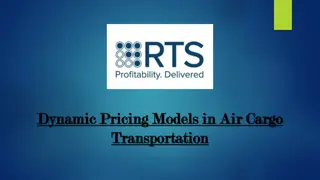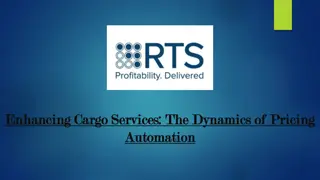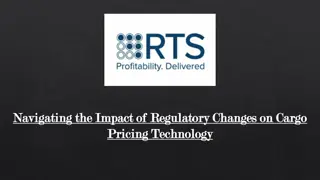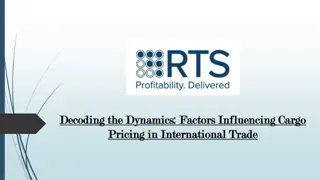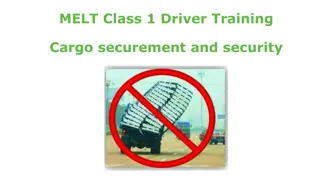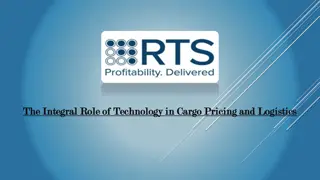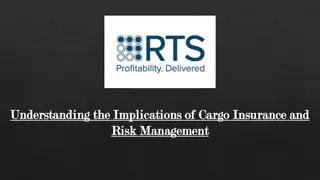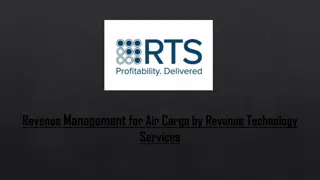
The Evolution of Air Cargo Pricing
Air cargo pricing has undergone significant transformation over the past few decades. With the increasing globalization of trade and the rapid advancement of technology, the methods and strategies used to determine air cargo pricing have evolved to m
Download Presentation

Please find below an Image/Link to download the presentation.
The content on the website is provided AS IS for your information and personal use only. It may not be sold, licensed, or shared on other websites without obtaining consent from the author. If you encounter any issues during the download, it is possible that the publisher has removed the file from their server.
You are allowed to download the files provided on this website for personal or commercial use, subject to the condition that they are used lawfully. All files are the property of their respective owners.
The content on the website is provided AS IS for your information and personal use only. It may not be sold, licensed, or shared on other websites without obtaining consent from the author.
E N D
Presentation Transcript
Air cargo pricing has undergone significant transformation over the past few decades. With the increasing globalization of trade and the rapid advancement of technology, the methods and strategies used to determine air cargo pricing have evolved to meet the changing demands of the market. This blog explores the key trends and innovations shaping the evolution of air cargo pricing, highlighting how Revenue Technology Services is at the forefront of these developments.
Historical Perspective Traditionally, air cargo pricing was primarily based on weight and volume. The process was straightforward: the heavier or bulkier the cargo, the higher the cost. This simplistic approach, while easy to understand, often failed to account for other critical factors such as the type of goods, their value, and the urgency of delivery. Consequently, it led to inefficiencies and a lack of flexibility in pricing strategies. The Shift Towards Dynamic Pricing One of the most significant trends in air cargo pricing is the shift towards dynamic pricing. Dynamic pricing involves adjusting prices in real-time based on various factors such as demand, capacity, and competition. This approach allows airlines to optimize their revenue by charging higher prices during peak demand periods and offering discounts when demand is low. Revenue Technology Services has been a pioneer in implementing dynamic pricing solutions for the air cargo industry. Their advanced algorithms analyze market trends, historical data, and real-time information to recommend optimal pricing strategies. This innovation has enabled airlines to maximize their revenue potential while providing customers with more competitive rates.
The Role of Technology in Pricing Innovation The advent of big data and advanced analytics has revolutionized air cargo pricing. Airlines now have access to vast amounts of data that can be used to predict demand, identify pricing trends, and optimize pricing strategies. Machine learning and artificial intelligence (AI) are playing a crucial role in this transformation. Revenue Technology Services leverages AI and machine learning to develop predictive models that forecast demand and optimize pricing in real-time. These models consider various factors, including historical booking patterns, market conditions, and external influences such as weather and geopolitical events. By harnessing the power of technology, airlines can make data-driven pricing decisions that enhance their profitability and competitiveness. Innovations in Ancillary Revenue Management In addition to dynamic pricing, there has been a growing focus on ancillary revenue management in the air cargo industry. Ancillary revenue includes income generated from services other than the core transportation of goods, such as packaging, insurance, and priority handling. By offering a range of ancillary services, airlines can diversify their revenue streams and provide customers with more value-added options.
Conclusion The evolution of air cargo pricingis marked by significant trends and innovations that have transformed the industry. The shift towards dynamic pricing, the role of technology in pricing innovation, and the focus on ancillary revenue management are shaping the future of air cargo pricing. Revenue Technology Services is at the forefront of these developments, providing airlines with cutting-edge solutions that optimize their pricing strategies and enhance their revenue potential. As the air cargo industry continues to evolve, it is essential for airlines to stay ahead of the curve by embracing these trends and innovations. By leveraging the expertise and technology offered by Revenue Technology Services, airlines can navigate the complexities of air cargo pricing and achieve sustainable growth in an increasingly competitive market.



